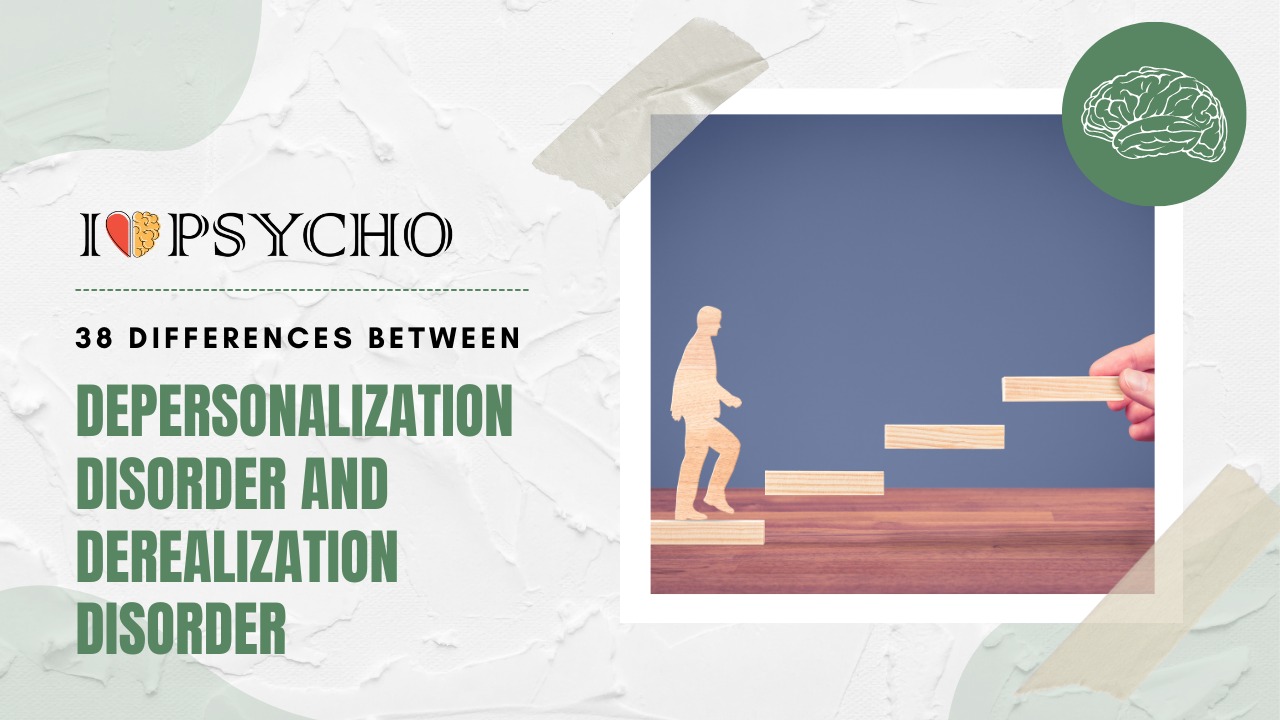In dissociative disorders, Depersonalization Disorder and Derealization Disorder are similar yet separate. While similar, they impact people’s self-perception and environment differently. The main symptom of Depersonalization Disorder is self-alienation. It may feel that those affected are watching themselves from outside their body, disconnecting them from their thoughts, emotions, and bodily sensations. People with this illness may feel like robots or automatons, with mechanical movements and feelings. Detachment can cause severe discomfort and reduce everyday functioning.
Derealization Disorder is a continuous sensation of unreality or separation from the outside world. This disease may cause confused, dreamy, or unreal perceptions. Things and people may look like movie props or veiled humans, creating a detachment from the surroundings. Similar to Depersonalization Disorder, Derealization Disorder can cause distress and impair social interaction.
The main emphasis of dissociation distinguishes the diseases. Depersonalization Disorder entails self-detachment and identity loss. However, Derealization Disorder entails dissociation from the outside world, creating a skewed reality. Drug use, trauma, stress, and anxiety can cause both diseases. While mindfulness promotes grounding and present-moment awareness, CBT helps people identify and overcome erroneous thought patterns and ideas about their experiences.
In essence, Depersonalization Disorder and Derealization Disorder are psychiatric illnesses that cause alienation from oneself and the environment. Derealization Disorder distorts the surroundings, whereas Depersonalization Disorder disconnects one from one’s identity, ideas, and feelings. Though they share causes and treatments, recognizing the differences between these diseases is essential for correct diagnosis and effective treatment.
Also Read:49 Difference between Obsessive-Compulsive Disorder (OCD) and Post-Traumatic Stress Disorder (PTSD)
Here are 38 differences between Depersonalization Disorder and Derealization Disorder:
|
S.No. |
Aspects |
Depersonalization Disorder |
Derealization Disorder |
|
1 |
Definition |
In Depersonalization Disorder, individuals experience a persistent feeling of detachment from themselves, as if they are observing themselves from the outside. |
Derealization Disorder involves a persistent sense of unreality or detachment from the external world, leading to a feeling that the world is strange or unreal. |
|
2 |
Perception |
Depersonalization Disorder primarily affects one’s perception of self. |
Derealization Disorder primarily affects one’s perception of the external world. |
|
3 |
Emotional State |
Individuals with Depersonalization Disorder often feel emotionally numb or detached from their own emotions. |
Those with Derealization Disorder may feel emotionally numb or experience emotions that seem disconnected from the world around them. |
|
4 |
Trigger |
Depersonalization episodes can be triggered by stress, trauma, or anxiety. |
Derealization episodes can also be triggered by stress, trauma, or anxiety. |
|
5 |
Sensory Perception |
Depersonalization mainly pertains to the sense of self, leading to feelings of disconnection from one’s body or identity. |
Derealization primarily involves feelings of unreality about the external environment, such as objects or surroundings. |
|
6 |
Cognitive Experience |
In Depersonalization, individuals may have a distorted perception of their body or self-concept. |
In Derealization, individuals may perceive their surroundings as foggy, dreamlike, or distorted. |
|
7 |
Self-Identity |
Depersonalization Disorder may lead to individuals feeling as though they are not in control of their own bodies or that their bodies are unreal. |
Derealization Disorder may cause individuals to feel like the world around them is distorted, unfamiliar, or artificial. |
|
8 |
Duration |
Depersonalization episodes can be fleeting or chronic, lasting for extended periods. |
Derealization episodes can also be transient or chronic, with some lasting for weeks or even months. |
|
9 |
Onset |
Depersonalization symptoms can begin suddenly or gradually. |
Derealization symptoms can also emerge suddenly or develop gradually over time. |
|
10 |
Impact on Identity |
Depersonalization Disorder may make individuals question their sense of self and identity. |
Derealization Disorder may make individuals question the reality of the external world. |
|
11 |
Associated Symptoms |
Depersonalization is often accompanied by symptoms like feeling robotic or disconnected from one’s body. |
Derealization may involve symptoms such as altered perception of size, distance, or shape of objects. |
|
12 |
Co-Occurrence |
Depersonalization Disorder can co-occur with other conditions like anxiety, depression, or dissociative disorders. |
Derealization Disorder can also co-occur with various mental health conditions. |
|
13 |
Perception of Time |
In Depersonalization, time may feel distorted or as if it is passing slowly or quickly. |
In Derealization, time perception may also be altered, with moments feeling elongated or condensed. |
|
14 |
Cognitive Clarity |
Individuals with Depersonalization Disorder may still perceive the external world with clarity. |
Individuals with Derealization Disorder may experience cognitive fog or confusion regarding their surroundings. |
|
15 |
Coping Mechanisms |
Those with Depersonalization may engage in self-observation or questioning their identity as a coping mechanism. |
Individuals with Derealization may focus on the strangeness or unreality of their surroundings. |
|
16 |
Impairment |
Depersonalization can lead to impairment in daily functioning and may affect personal relationships. |
Derealization can also impair daily life, making it difficult to engage with the world as it is perceived. |
|
17 |
Dissociation |
Depersonalization is a form of dissociation focused on self-detachment. |
Derealization is a form of dissociation focused on the external world. |
|
18 |
Reality Testing |
Individuals with Depersonalization may question their own reality but generally maintain a clear sense of the external world. |
Individuals with Derealization may question the reality of both themselves and the external world. |
|
19 |
Treatment Focus |
Treatment for Depersonalization Disorder often centers on addressing the individual’s sense of self and identity. |
Treatment for Derealization Disorder often focuses on addressing the perception of the external world. |
|
20 |
Medication |
Medication may be used to treat Depersonalization Disorder, but its effectiveness varies. |
Medication is not a primary treatment for Derealization Disorder but may be used for co-occurring conditions. |
|
21 |
Psychotherapy |
Psychotherapy, such as cognitive-behavioral therapy (CBT) or dialectical-behavior therapy (DBT), is commonly used to treat Depersonalization Disorder. |
Psychotherapy, particularly exposure therapy and grounding techniques, is often used to treat Derealization Disorder. |
|
22 |
Self-Recognition |
Individuals with Depersonalization may still recognize themselves in mirrors or photographs. |
Individuals with Derealization may have difficulty recognizing themselves in mirrors or photos. |
|
23 |
Sense of Existence |
Depersonalization can lead to a diminished sense of existence or feeling like an automaton. |
Derealization can lead to a sense of existential crisis or questioning the reality of existence itself. |
|
24 |
Connection to Trauma |
Depersonalization episodes may be linked to trauma, but they can also occur in non-trauma-related situations. |
Derealization episodes may be associated with trauma but can also occur independently of trauma. |
|
25 |
Impact on Relationships |
Depersonalization can affect interpersonal relationships due to the emotional detachment it brings. |
Derealization can impact relationships because individuals may struggle to engage with the world as it appears to them. |
|
26 |
Brain Activity |
Depersonalization is associated with alterations in brain activity, including changes in the default mode network. |
Derealization is also linked to altered brain activity, but the specifics may differ from Depersonalization. |
|
27 |
Cultural Factors |
The experience of Depersonalization may vary across cultures, but it remains a recognized mental health condition. |
Derealization is recognized across cultures but may also have cultural variations in symptom expression. |
|
28 |
Age of Onset |
Depersonalization symptoms can emerge at any age but are often reported in late adolescence or early adulthood. |
Derealization symptoms can also emerge at any age, with some cases beginning in childhood. |
|
29 |
Connection to Anxiety |
Depersonalization is closely linked to anxiety, and episodes may worsen during periods of heightened stress. |
Derealization is also associated with anxiety, and stress can exacerbate its symptoms. |
|
30 |
Concept of Self |
Depersonalization may lead to a distorted sense of self but not necessarily a sense of the world being unreal. |
Derealization may distort the perception of both self and the external world. |
|
31 |
Connection to Dissociative Disorders |
Depersonalization Disorder is often considered a dissociative disorder. |
Derealization Disorder is also classified as a dissociative disorder. |
|
32 |
Memory Impairment |
Depersonalization episodes may not necessarily lead to memory impairment. |
Derealization episodes may affect memory, particularly regarding the experience of unreality. |
|
33 |
Interference with Activities |
Depersonalization can interfere with activities that involve self-perception, such as self-care. |
Derealization can interfere with activities that require engagement with the external environment. |
|
34 |
Coping Strategies |
Individuals with Depersonalization may use grounding techniques to reconnect with their sense of self. |
Those with Derealization may use grounding techniques to reconnect with the external world. |
|
35 |
Perceived Threat |
Depersonalization is not necessarily related to a perceived threat in the environment. |
Derealization may involve a perceived threat to the external world or the self. |
|
36 |
Treatment Challenges |
Treating Depersonalization Disorder can be challenging due to its focus on the self, which can be difficult to change. |
Treating Derealization Disorder can also be challenging because it involves altering perceptions of the external world. |
|
37 |
Prevalence |
Depersonalization Disorder is relatively rare compared to other mental health conditions. |
Derealization Disorder is also relatively rare but may have a higher prevalence in certain populations. |
|
38 |
Research Focus |
Research on Depersonalization often investigates its neural basis and its relation to other mental health conditions. |
Research on Derealization focuses on understanding the perceptual alterations involved and its connection to trauma. |
Also Read: 31 Difference between Schizophrenia and Schizoaffective Disorder
Frequently Asked Questions (FAQS)
Q.1 What distinguishes Depersonalization Disorder from Derealization Disorder?
People with Depersonalization Disorder feel detached from themselves and see their thoughts, emotions, and behaviors as unreal or mechanical. Derealization Disorder, on the other hand, entails a constant sensation of detachment from the outside world, making everything seem twisted, dreamy, or unreal.
Q.2 What causes Depersonalization and Derealization Disorders?
Trauma, stress, anxiety, and substance use can cause both diseases. Traumatized or stressed people are more likely to acquire these diseases. They also commonly coexist with anxiety, despair, and PTSD.
Q.3 How are Depersonalization and Derealization Disorders diagnosed?
The diagnosis of these diseases requires a thorough evaluation by a psychiatrist or psychologist. The diagnosis evaluates the patient’s symptoms, medical history, and mental health. Since these problems might mimic other mental health conditions, additional causes must be ruled out. The DSM-5 specifies diagnosis criteria for these diseases.
Q.4 What are Depersonalization and Derealization Disorder treatments?
Psychotherapy, especially CBT, is the main treatment for these diseases. CBT helps people recognize and change incorrect thinking patterns and beliefs about their experiences. Grounding exercises and other mindfulness approaches can help manage dissociative symptoms. Coexisting illnesses like anxiety or depression may require medication.
Q.5 Are depersonalization and derealization disorders curable?
Although “cures” for these conditions are uncommon, proper therapy and management can relieve symptoms for many people. Psychotherapy, especially CBT, can help people manage dissociation and build coping skills. Early intervention and persistent therapy can enhance quality of life and reduce suffering. The result depends on each person, and some may need continuous care to manage their illness.









